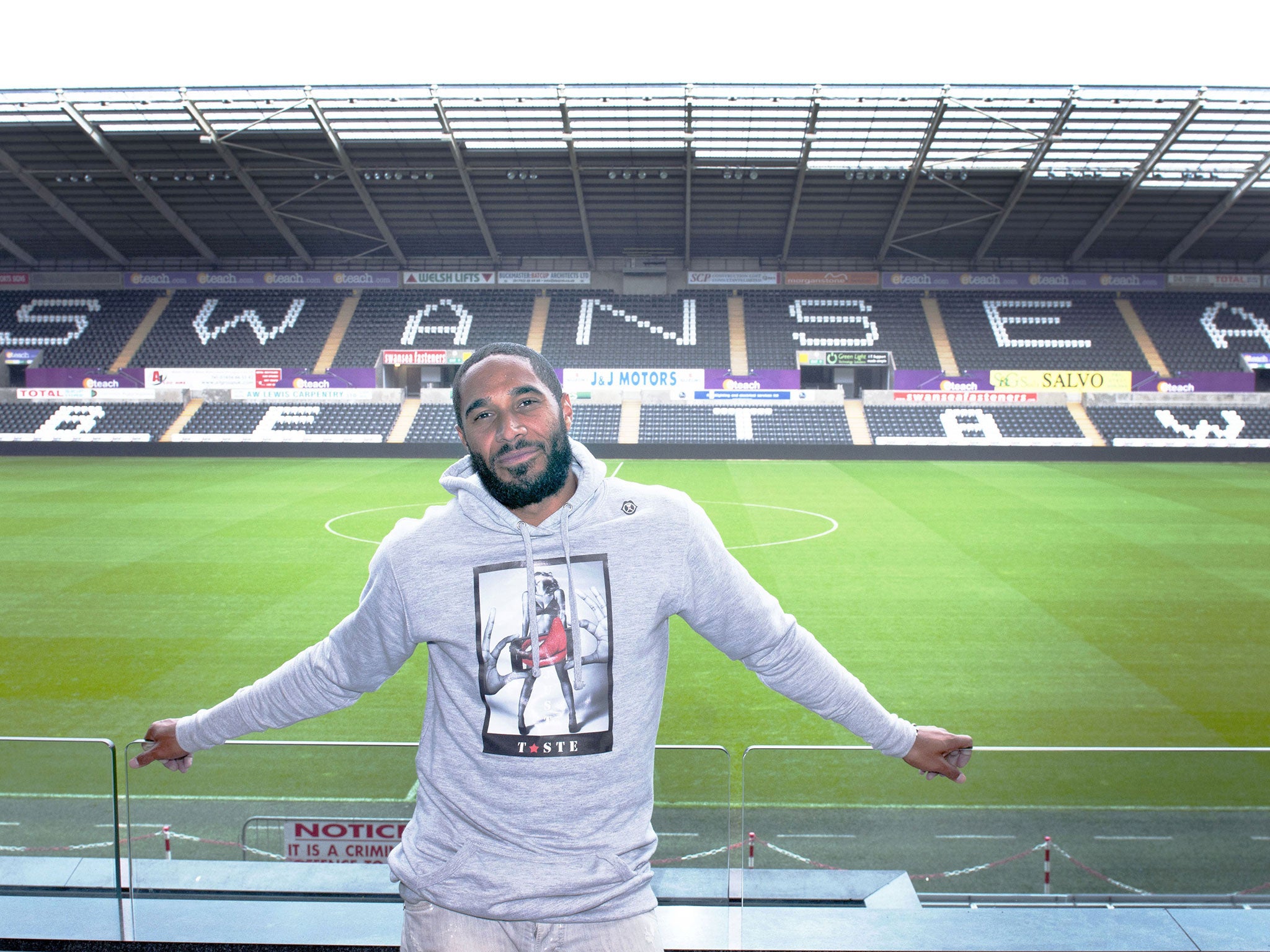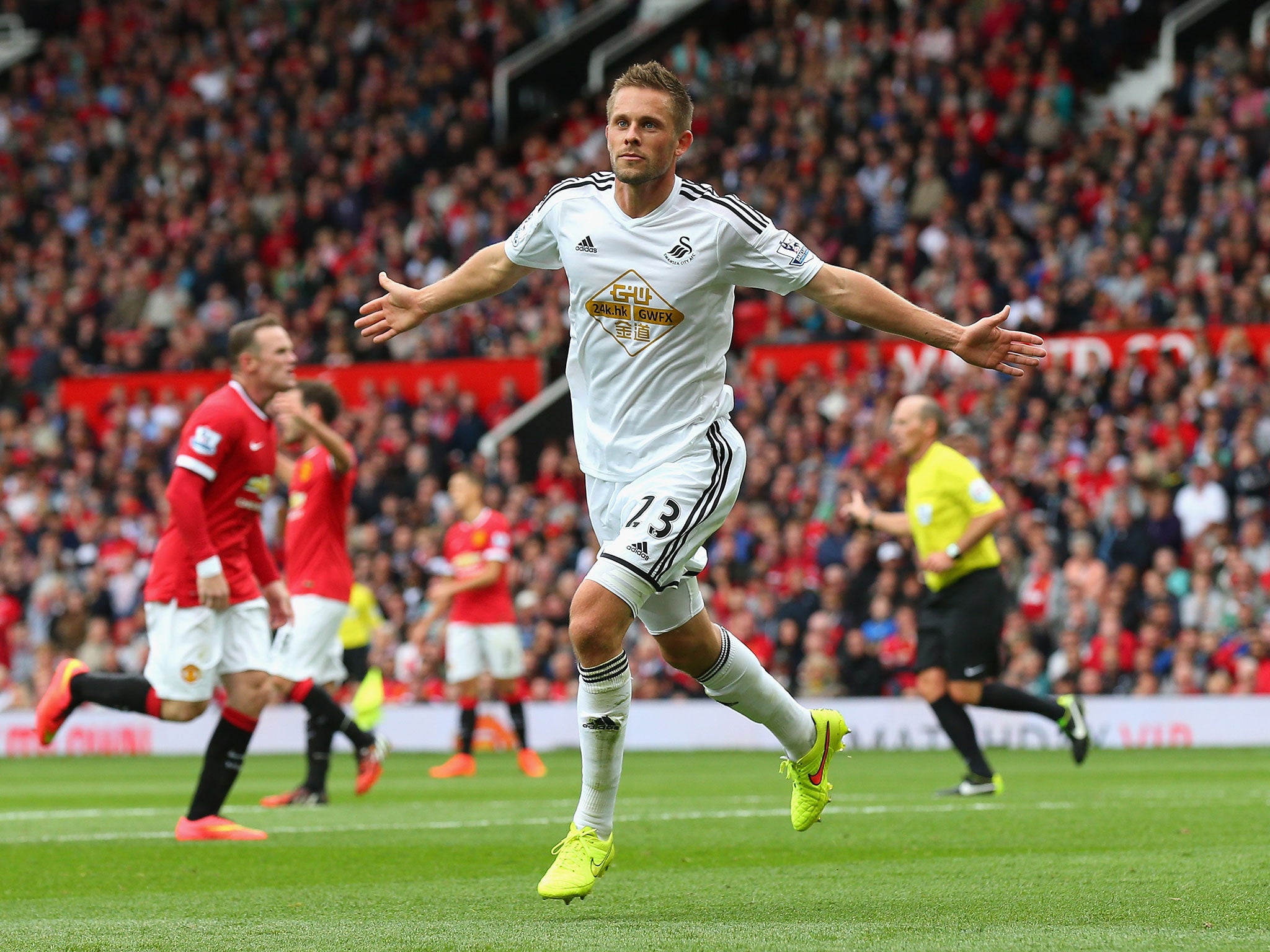Ashley Williams interview: Swansea City captain savours rewards of the long road to the top
Swansea captain’s scrap to reach the Premier League enables him to retain a sense of perspective, he tells Glenn Moore

Your support helps us to tell the story
From reproductive rights to climate change to Big Tech, The Independent is on the ground when the story is developing. Whether it's investigating the financials of Elon Musk's pro-Trump PAC or producing our latest documentary, 'The A Word', which shines a light on the American women fighting for reproductive rights, we know how important it is to parse out the facts from the messaging.
At such a critical moment in US history, we need reporters on the ground. Your donation allows us to keep sending journalists to speak to both sides of the story.
The Independent is trusted by Americans across the entire political spectrum. And unlike many other quality news outlets, we choose not to lock Americans out of our reporting and analysis with paywalls. We believe quality journalism should be available to everyone, paid for by those who can afford it.
Your support makes all the difference.It is a wet bank holiday Monday when I meet up with Ashley Williams at Swansea’s Liberty Stadium. The Swansea captain had originally arranged to meet after morning training, only to be reminded by his wife, as he began pulling on his kit, that training had been switched to the evening in preparation for the following night’s Capital One Cup tie.
Nevertheless, Williams made the journey into the Liberty for our appointment and arrives bang on time. Common courtesy you might say, but not always so common with footballers. A few days’ prior Brendan Rodgers, Liverpool manager, had railed against the dangers of giving young footballers “too much, too young”, of them “losing their hunger”, and “careers falling away”, a phenomenon which is often combined with a lack of respect for people outside the game. Williams worked under Rodgers at Swansea and says: “I’ve not seen that here, but if someone like Brendan’s saying it, it might be a problem.”
Too much, too young was never going to be an issue for Williams. At 16 he was on football’s scrap heap, released by West Bromwich Albion. At 19 he was playing non-league. At 23 he was playing in League Two. He is now captain of Wales as well as Swansea, but it has been a long road to the summit for a player who celebrated his 30th birthday last weekend by steering the Swans to joint-top of the Premier League, and he has not forgotten.
Like many people who have come into wealth from more modest beginnings he frets about how to solve the conundrum that he wants to give his children all the things he could not have, but worries that this risks them growing up not appreciating how fortunate they are.
The same applies to Rodgers’ spoilt young footballers and, with the benefit of experience, Williams is glad he had to strive.
“I like the fact that I lived in the real world for a bit, I know what it is to go out and work and play in the lower leagues,” he says. “Young boys do get a lot of money now, to have that when I was 18 would have been a disaster, probably. I’ve got a good support, both parents, my wife, family, friends, to keep me grounded, but it would have been difficult.
“I think most of us play to get money, to get nice things and look after the people we love, so when you’ve done that so early what’s next? Where is your inspiration? That is where the real challenge is.”
It is quite rare for a footballer to state baldly “we play to get money”, though most of us work primarily to that end however enjoyable the job. Williams elaborates. “We all start because we like football, then you think, ‘I can make a job of it’. For me I wanted to earn money, not because I was greedy with money, but because I wanted nice things, I wanted to make sure mum and dad didn’t have to work any more, that I could provide for people. That was the big thing. A lot of footballers don’t come from money, at 18 with no money in my pocket it was massive [to be paid for playing].
“Then, as you keep going, you to want to win things, you want to get to a higher league. Then the kids come and you are pushing for the next contract, and more money as you know you finish at 35, but you live to God knows when, and you don’t know what is around the corner. So there is always something you are pushing for. You need to find something to push for.”
At each stage, from Hednesford Town, to Stockport County, to Swansea City, Williams has done that. He joined the Swans in 2008, when they were heading for promotion from League One.
Sitting in one of the Liberty’s smart function rooms he says: “I could never have imagined this. My first aim was to try and establish myself in the Championship. When I came here, people wonder what you are about, even myself, you have little doubts. You see players on TV and always think, ‘I can do that’, but until you get there you never know. It is sink or swim.
“Every level you go up, from the Conference right through, you have to work a bit harder to make sure you perform, by working harder you end up doing well, your confidence goes up, you feel more of a part of it.”

Arriving in the Premier League he was determined to “really give it a go rather than be half-hearted and then fall back down the leagues”. He adds: “If it turned out I was not good enough, it would not be for the want of trying.”
Williams has been good enough to attract interest from clubs like Arsenal, but nothing ever materialised and he signed a new four-year contract in the summer. “That was always what I wanted to do,” he says. “I like being at Swansea. When I leave, whether they sell me or I retire, I want them to be an established Premier League team.”
They are close already. There was upheaval last season with Michael Laudrup sacked midway through the campaign, a year after he had overseen a top-10 finish and Football League Cup win. But veteran defender Garry Monk stepped up as caretaker and stabilised the club so well his position was made permanent in the summer.
Swansea have since lost Michu, Michel Vorm, Chico Flores and Ben Davies, but having brought in Gylfi Sigurdsson, Jefferson Montero, Lukasz Fabianski, Bafetimbi Gomis and Federico Fernandez look stronger.
“Michael Laudrup’s first season was great for everyone, but last season it started to fall apart,” says Williams. “Garry Monk got the job and I can’t believe how well he has done. I said to him before a ball was kicked, ‘No matter what happens now you could not have prepared us any better’. It feels like what I have known at Swansea, a nice club with a friendly atmosphere.”
Swansea host West Bromwich Albion today, having begun the season winning at Old Trafford to spark Manchester United’s current meltdown, and followed up by defeating Burnley.
“Man United almost takes care of itself, it is a massive game with millions watching – to see them, not us – so we were all up for it, but Burnley could have been tricky. If we had lost it would have undone the hard work of the week before, but we battled it out. It is a great start. I have had seasons where we have struggled to get off the mark and especially to get that first win, the pressure mounts and mounts.”
The international break follows, with Williams leading a Welsh team who have genuine hope of qualifying for a major tournament for the first time since 1958. Their Euro 2016 qualifying group features Bosnia, Belgium, Israel, Cyprus and Andorra, who are their first opponents on Tuesday week.
“It is not easy,” says Williams, “but we couldn’t ask for any more from a group. We have one of the world’s best players [Gareth Bale] and one of the league’s best players [Aaron Ramsey]. We need to be consistent. If we have our best XI out for the majority of the games we stand a very good chance.”
Throughout the interview one aspect has jarred. Williams is wearing a grey hoodie with a picture on the front of a woman in her underwear over which is superimposed a lascivious tongue. It is an arresting image, but one which is at odds with his mature, thoughtful demeanour. As he poses by the pitch for photographs I ask him about it.
He explains: “A friend who designed this had said, ‘If you’re doing anything can you do me a favour and wear it?’ I thought, ‘But this is for The Independent’.”
My other life - Going to the beach
I have three young children, ages three and a half, one and a half and four weeks, so I spend most of my free time with them. They grow up so quickly you need to spend as much time with them as you can. There are lovely beaches near Swansea and we’re only a minute away from one, so we go there regularly.
Four-square in defence of familiar formation
As a ball-playing defender Williams might be expected to be in favour of three-at-the-back system that has returned to fashion, notably with the Manchester United team Swansea defeated on the opening day.
However, he said: “I played it a lot with Wales under John Toshack, I would do whatever the manager asked, but if he said, ‘I want to play three at the back on Saturday’, I would not be too impressed. It is not something I enjoy. I like a four, we grew up in a four in Britain, it is what we know. I am open to it if we worked on it, and we did in pre-season in case we need to play it, but I don’t think there are many centre-halves – even if you asked those ones who are playing it now – who would be too happy about it. It is a bit alien to us. If you are the outside centre-back you have nothing wide of you, no cover. You end up sometimes being a full-back and we never like going into those areas.”
Join our commenting forum
Join thought-provoking conversations, follow other Independent readers and see their replies
Comments